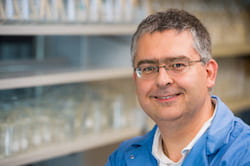NEWS RELEASE
Jeff Falk
713-348-6775
jfalk@rice.edu
Mike Williams
713-348-6728
mikewilliams@rice.edu
Rice chemist wins grant to simplify drug design
Fed award to László Kürti will support sophisticated, simplified drug precursors
HOUSTON – (April 8, 2020) – Rice University chemist László Kürti and his lab have received a prestigious Maximizing Investigators’ Research grant from the National Institutes of Health (NIH) to speed up drug design by simplifying the synthesis of essential precursors.
The five-year grant worth $1.87 million, administered by the National Institute of General Medical Sciences, will support the lab’s continuing research into amines and their derivatives. These common, nitrogen-containing structural motifs are present in the overwhelming majority of drug molecules, agrochemicals and functional materials as well as compounds produced by living organisms.
Amines are also valuable as intermediates for the synthesis of new drugs. A simple method to synthesize these building blocks makes them more available for such use, said Kürti, an associate professor of chemistry.
Exposing the amines’ nitrogen atoms in their unprotected forms allows them to more easily react with other molecules, he said. The project abstract noted the compounds the lab hopes to produce “could have a far-reaching impact upon how organic synthesis, medicinal chemistry, biochemistry and chemical biology are practiced.”
“We’re grateful to the NIH for their continued support of our research program,” Kürti said. “The important discoveries made and the high-profile papers published since 2015 would not have been possible without the hard work, dedication and innovative spirit of my graduate students and postdoctoral fellows. I am indebted to them and looking forward to many new and exciting discoveries during the next five years.”
He also expects the lab’s precursors will enable more environmentally friendly drug development.
The Kürti lab specializes in simplifying synthetic processes once seen as difficult, if not impossible. In recent years, the lab has introduced methods to make aziridines that react with other agents, azetidines that serve as scaffolds for pharmaceutical design and a one-step technique to add nitrogen to compounds for drugs, pesticides, fertilizers and other products.
-30-
Read the abstract at https://projectreporter.nih.gov/project_info_details.cfm?aid=9931954&icde=49492779.
Follow Rice News and Media Relations via Twitter @RiceUNews.
Related materials:
Kürti Research Group: http://kurtilabs.com
Rice Department of Chemistry: https://chemistry.rice.edu
Wiess School of Natural Sciences: https://naturalsciences.rice.edu
Image for download:
https://news2.rice.edu/files/2020/04/0824_KURTI-1-web.jpg
CAPTION: László Kürti. (Credit: Jeff Fitlow/Rice University)
Located on a 300-acre forested campus in Houston, Rice University is consistently ranked among the nation’s top 20 universities by U.S. News & World Report. Rice has highly respected schools of Architecture, Business, Continuing Studies, Engineering, Humanities, Music, Natural Sciences and Social Sciences and is home to the Baker Institute for Public Policy. With 3,962 undergraduates and 3,027 graduate students, Rice’s undergraduate student-to-faculty ratio is just under 6-to-1. Its residential college system builds close-knit communities and lifelong friendships, just one reason why Rice is ranked No. 1 for lots of race/class interaction and No. 4 for quality of life by the Princeton Review. Rice is also rated as a best value among private universities by Kiplinger’s Personal Finance.



